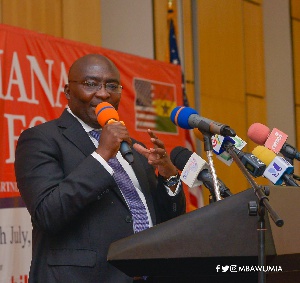Vice President Dr. Mahamudu Bawumia has described as scary the performance of the opposition National Democratic Congress (NDC) whilst in office, urging Ghanaians to reject them in election 2020 and subsequent polls.
“The NDC in government after 8 years in office is one that Ghanaians could and should no longer tolerate,” Dr Bawumia said Monday at the ongoing National Policy Summit in Tamale.
He said under the erstwhile NDC administrations, economic growth was declining unabated with rising unemployment, high fiscal deficit reaching 9.3 per cent of GDP in 2016, rising public debt, pushing the debt to GDP ratio to 73.1percent, high-interest rate, the collapse of the National Health Insurance Scheme (NHIS), the virtual freeze on the hiring of public sector workers and weakening of the banking sector among others.
The economy, he said, with the coming in of the New Patriotic Party (NPP) has been transformed making it attractive to investors.
He said: “The NPP under Nana Addo Dankwah Akufo-Addo promised among other things to change the education system, to introduce free Senior High School education, to change the management of the economy from the focus on taxation to the focus on production, to change from most districts with no factories to a philosophy of one-district-one-factory, to change from a situation where most villages in the north have no dams to a position of one-village-one-dam, to change from the predominance of sole-sourcing from public procurement to tendering in procurement, to change from the abolishing of teacher trainee allowances to the restoration of teacher trainee allowances, to change from the abolishing of nursing trainee allowances to the restoration of nursing trainee allowances, to change from a highly informal economy to the formalization of the economy through digitization, through the issuance of a national ID card, through the implementation of the national digital addressing system…to change from the rising debt to GDP ratio to the declining debt to GDP ratio, to change from a weakening banking system to a stronger banking system.”
Debt to GDP declining despite our borrowing
Dr Bawumia who led the attacks on the NDC whilst in opposition for what he termed “excessive” borrowing noted at the ongoing National Policy Summit that criticism of the Akufo-Addo government borrowing is baseless.
According to him, it will be foolhardy to compare NDC’s borrowing to the NPP’s.
“If you look at the data you will realise that whilst they (NDC) were borrowing, the debt to GDP ratio was increasing, jumping and ballooning. But while we are borrowing the debt to GDP is declining. So they should take a closer look at the data and come back again,” he said to the excitement of the participants of the summit who are largely enthusiasts of the governing NPP.
Strong economic outlook
He said per available date, the macroeconomic performance of the government is unparalleled, showing that Ghana’s economic fundamentals “are strong.” “This was confirmed last week by Standard and Poor, a global rating agency which has upgraded Ghana’s ratings, sovereign credit rating from B minus to B with a stable outlook. And, this is the first upgrade that Ghana has received in 10 years. In fact, we should recall that the NPP under President John Agyekum Kufuor left office with Ghana’s rating at B plus. After 8 years of the NDC’s economic management, our ratings went from B plus to B minus. This is after 8 years! After only 20 months of new NPP government under Nana Addo Dankwa Akufo-Addo, we have been upgraded from B minus to B.”
The cedi politics
Revisiting the thorny issue of the cedi depreciation, Dr Bawumia maintained that but for the strength of the fundamentals of the economy, the depreciation of the cedi would have been much direr than it’s been witnessed under the NDC.
He said, “Over the last few months, the US dollar internationally has strengthened against many currencies. In Argentina, the peso has depreciated by 50.2percent, in Turkish the Lira has depreciated by, 42percent, in South Africa, the rand has depreciated by 19.2percent, in India, the rupee has depreciated by 11.2 per cent, in the UK, and the British pound has depreciated by 4.2percent, in Ghana the cedi has depreciated by 7percent.
“It’s in this context that we are saying that the cedi to dollar exchange rate has been relatively stable.”
The cedi in the last few weeks recorded massive losses against the dollar, selling at GH¢4.97 to the dollar. It followed a July fall where it traded at GH¢4.8250 to the dollar depreciating cumulatively, by 5.3 per cent in the first six months, compared to 3.3 per cent in the first half of 2017 despite significant increments of weekly dollar sales to local banks in the country.
General News of Monday, 24 September 2018
Source: starrfmonline.com

















